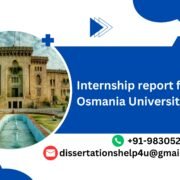Internship report writing for Alliance University MBA
Introduction
Internship report writing for Alliance University MBA. In the journey of pursuing an MBA at Alliance University, crafting a comprehensive internship report holds significant importance. This report serves as a bridge between theoretical knowledge and practical application, offering insights into real-world scenarios and industry dynamics. Let’s delve into the intricacies of drafting an impactful internship report for Alliance University’s MBA program in English. Let’s read our blog “Internship report writing for Alliance University MBA“.
Define the Internship Experience
The internship report begins with a clear definition of the internship experience. It elucidates the nature of the internship, whether it’s a corporate stint, research project, or entrepreneurial endeavor. This section sets the stage by outlining the objectives and scope of the internship.
Importance of Internship Reports
Highlighting the relevance and importance of internship reports is crucial. It underscores how these reports contribute to academic learning, professional development, and career advancement. By contextualizing the significance, students comprehend the value of their internship experiences beyond the immediate term.
Types and Categories of Internships
Internships come in various forms, each offering distinct learning opportunities. From corporate internships in multinational companies to social sector engagements with NGOs, Alliance University encourages diverse experiences to broaden students’ perspectives.
Corporate Internships
These internships provide exposure to corporate culture, operations, and management practices. Students work on projects ranging from market analysis to strategic planning under the guidance of seasoned professionals.
Research Projects
Engaging in research projects fosters critical thinking and analytical skills. Students delve into specific topics, conduct literature reviews, gather data, and draw meaningful conclusions. These projects contribute to academia and offer insights into emerging trends.
Entrepreneurial Ventures
For aspiring entrepreneurs, Alliance University facilitates internships with startups and incubators. These experiences immerse students in the entrepreneurial ecosystem, where they witness firsthand the challenges and rewards of building a business from the ground up.
Symptoms and Signs of a Well-Written Internship Report
A well-crafted internship report exhibits certain symptoms and signs, indicating its quality and effectiveness.
Clear Structure and Organization
A structured approach is paramount in internship reports. Clear delineation of sections such as introduction, methodology, findings, and conclusions enhances readability and comprehension.
Critical Reflection
Beyond presenting facts and figures, exceptional internship reports feature critical reflection. Students analyze their experiences, identify learning points, and assess their personal and professional growth.
Alignment with Learning Objectives
Internship reports should align with the learning objectives set forth by Alliance University. Students demonstrate how their internship experiences align with course curriculum, academic goals, and career aspirations.
Causes and Risk Factors for Subpar Internship Reports
Despite the potential for enriching experiences, internship reports may fall short of expectations due to various causes and risk factors.
Lack of Guidance
Insufficient guidance from mentors and supervisors can impede the quality of internship reports. Students may struggle to navigate challenges or may not receive timely feedback, hindering their progress.
Limited Exposure
Internships that lack diversity in tasks or industries may limit students’ exposure. Narrow experiences restrict learning opportunities and may result in superficial or repetitive reports.
Time Constraints
Time constraints pose a significant risk to internship reports, particularly in fast-paced environments. Students may struggle to balance project deadlines with report deadlines, leading to rushed or incomplete submissions.
Diagnosis and Tests: Evaluating Internship Performance
Assessing internship performance requires a systematic approach to diagnosis and testing. Alliance University employs various tools and methods to evaluate students’ contributions and achievements during their internships.
Supervisor Evaluations
Supervisor evaluations provide firsthand insights into students’ performance and professionalism. These assessments gauge students’ communication skills, problem-solving abilities, and overall impact on the organization.
Peer Feedback
Peer feedback offers a 360-degree view of students’ performance, complementing supervisor evaluations. Colleagues provide valuable perspectives on collaboration, teamwork, and adaptability, enriching the assessment process.
Self-Assessment
Encouraging students to engage in self-assessment fosters introspection and accountability. Students reflect on their strengths, weaknesses, and areas for improvement, facilitating continuous learning and growth.
Treatment Options: Enhancing Internship Experiences
Addressing challenges and enhancing internship experiences requires proactive measures and supportive interventions.
Mentorship Programs
Establishing mentorship programs pairs students with seasoned professionals who offer guidance and support throughout their internships. Mentors serve as role models, advisors, and advocates, enriching students’ learning journeys.
Skill-Building Workshops
Conducting skill-building workshops equips students with essential competencies for internship success. Workshops on communication, time management, and project management empower students to navigate challenges effectively.
Networking Opportunities
Facilitating networking opportunities cultivates students’ professional connections and expands their career prospects. Networking events, industry panels, and alumni sessions enable students to build relationships and explore career pathways.
Preventive Measures: Ensuring Future Success
Implementing preventive measures is essential to ensure future success in internships and beyond.
Continuous Feedback Loops
Establishing continuous feedback loops fosters ongoing communication and improvement. Regular check-ins between students, supervisors, and mentors facilitate course corrections and optimize learning outcomes.
Experiential Learning Modules
Integrating experiential learning modules into the curriculum enriches students’ academic experiences. Hands-on projects, case studies, and simulations simulate real-world scenarios, preparing students for the challenges of internships and beyond.
Alumni Engagement Initiatives
Engaging alumni as mentors, guest speakers, and industry advisors fosters a sense of community and continuity. Alumni share their insights, experiences, and career trajectories, inspiring current students and offering valuable guidance.
Personal Stories or Case Studies: Experiences from Alliance University Students
Real-life anecdotes and case studies from Alliance University students illustrate the transformative power of internships.
A Tale of Transformation
Sophia, a marketing major at Alliance University, embarked on a summer internship at a digital marketing agency. Initially apprehensive, she quickly immersed herself in the fast-paced environment, contributing ideas and insights to client campaigns. Through mentorship and hands-on experience, Sophia honed her digital marketing skills and gained confidence in her abilities. The internship not only solidified her career aspirations but also forged lasting connections in the industry.
Navigating Challenges
Raj, a finance student, faced challenges during his internship at a financial consultancy firm. Balancing client demands, tight deadlines, and complex financial analyses tested his resilience and adaptability. With support from his supervisor and peers, Raj persevered, leveraging the opportunity to enhance his analytical prowess and client management skills. Despite the challenges, the internship proved instrumental in shaping Raj’s career trajectory and instilling in him a sense of perseverance.
Expert Insights: Guidance from Alliance University Faculty
Faculty members at Alliance University offer valuable insights and advice to students embarking on their internship journeys.
Dr. Smitha Rao, Dean of Academic Affairs
“Internships are invaluable learning experiences that bridge the gap between theory and practice. Approach your internships with an open mind, a willingness to learn, and a proactive attitude. Embrace challenges as opportunities for growth and leverage the guidance and support available to you. Your internship journey will shape not only your academic and professional development but also your personal growth and self-discovery.”
Prof. Rahul Khanna, Career Services Advisor
“Maximize the value of your internship experiences by setting clear goals, seeking feedback, and reflecting on your learning. Take initiative, build relationships, and showcase your skills and accomplishments. Your internship report is not just a document; it’s a testament to your journey of growth and development. Make it count!”
Conclusion: Internship report writing for Alliance University MBA
Crafting an effective internship report for Alliance University’s MBA program in English is a multifaceted endeavor that requires diligence, reflection, and strategic planning. By defining the internship experience, exploring various types and categories, diagnosing performance, and implementing preventive measures, students can maximize their learning outcomes and professional growth. Personal stories, expert insights, and faculty guidance enrich the internship journey, offering invaluable lessons and inspiration along the way.
Internship reports serve as tangible evidence of students’ achievements, contributions, and aspirations. They encapsulate the essence of experiential learning, showcasing students’ ability to apply theoretical knowledge in real-world settings. As students embark on their internship journeys, they are poised to make meaningful contributions, forge lasting connections, and embark on transformative learning experiences.
Thank you for read our blog “Internship report writing for Alliance University MBA”. I hope this blog is helpful to you, if you have any question feel free Call / WhatsApp: +91 9830529298 || Email: dissertationshelp4u@gmail.com.
Also read our more BLOG here.
#internshipreport, #AllianceUniversityMBA, #MBAinternship, #businessinternship, #reportwriting, #careerdevelopment, #professionalgrowth, #internshipexperience, #managementstudies, #academicwriting, #studentlife, #learningexperience, #careerbuilding, #internshipprogram, #managementinternship, #AllianceUniversity, #MBAjourney, #internshipsuccess, #futureleaders, #businesseducation, #educationjourney, #careerpath, #businessmanagement, #studentlife, #internshipdiaries, #businessreporting, #graduatestudies, #internshipgoals, #professionaldevelopment














